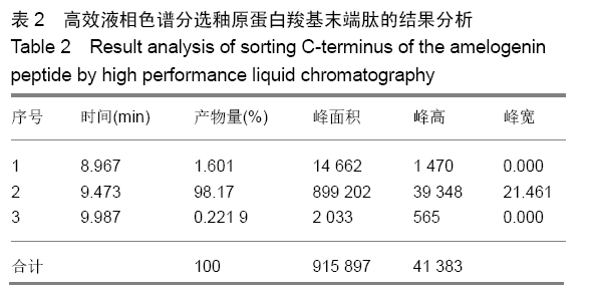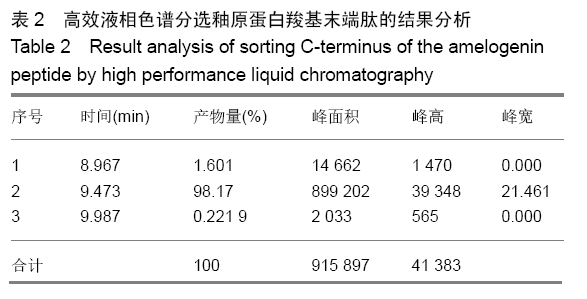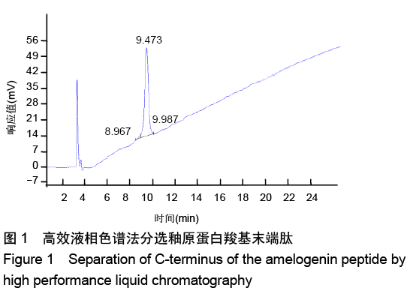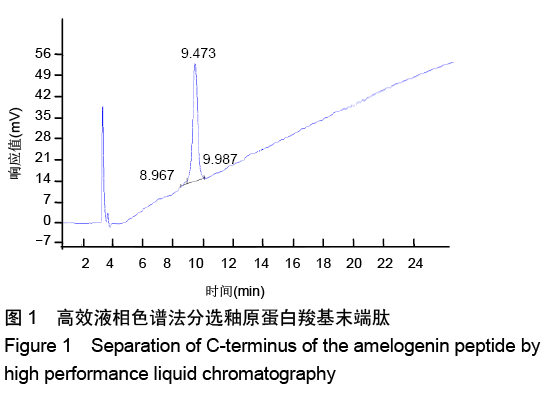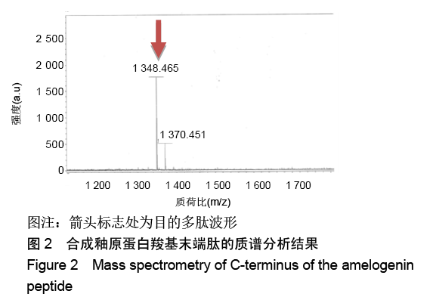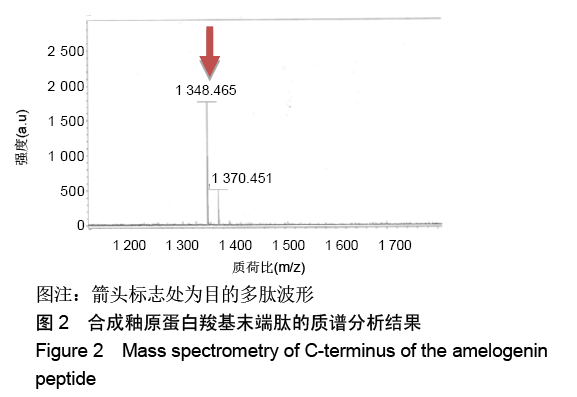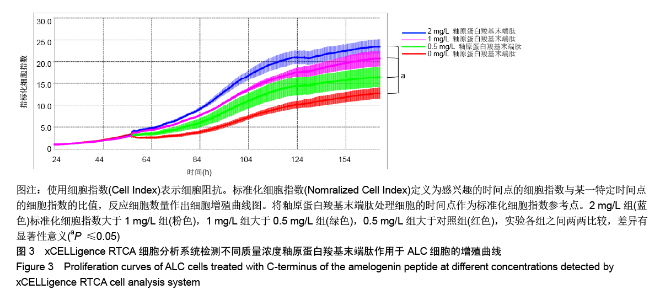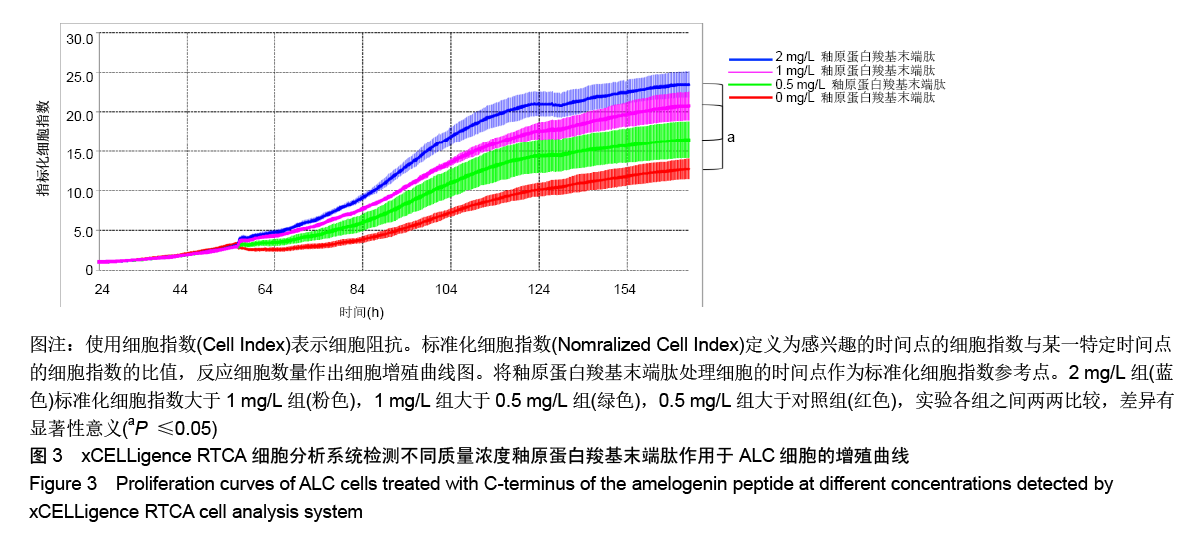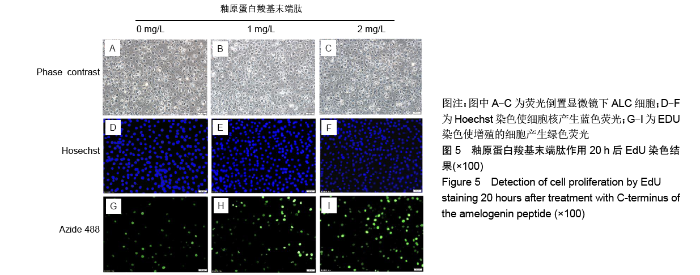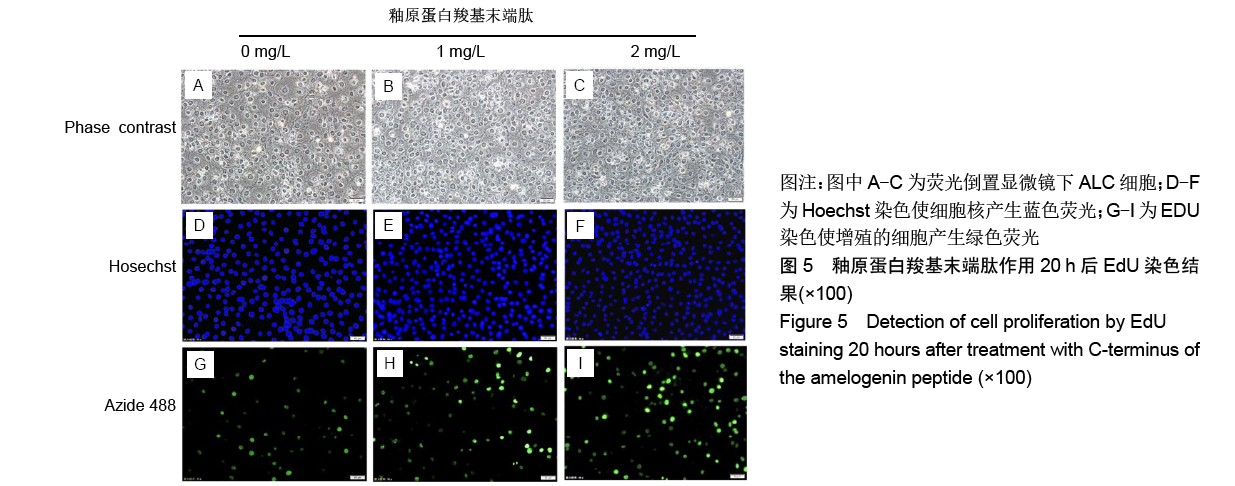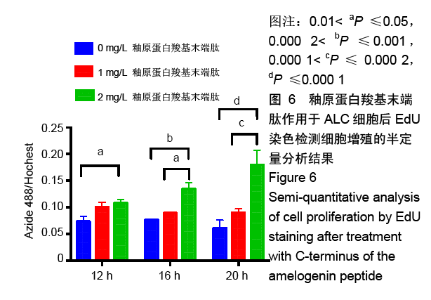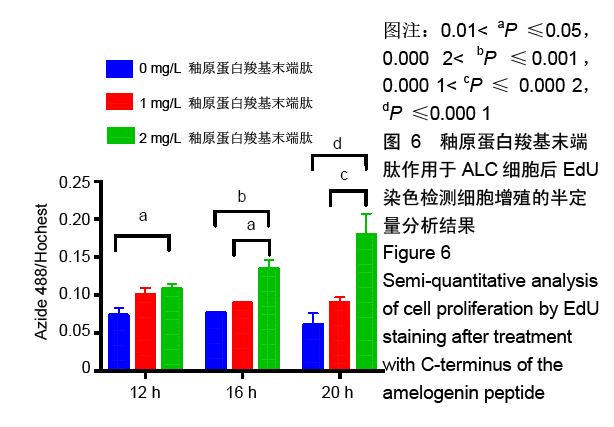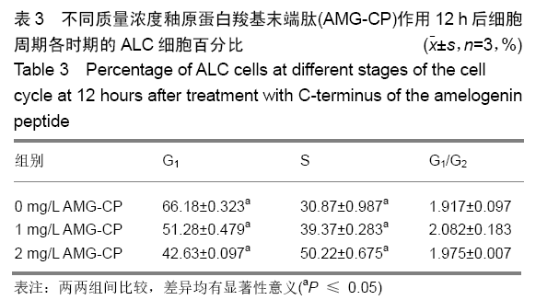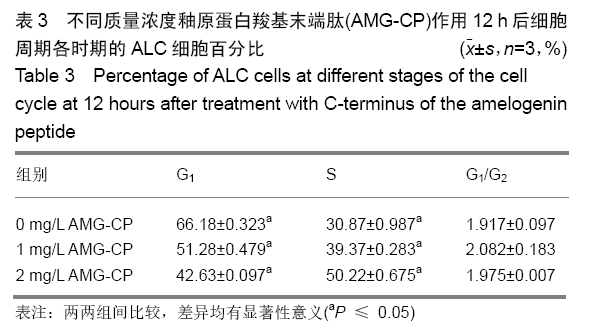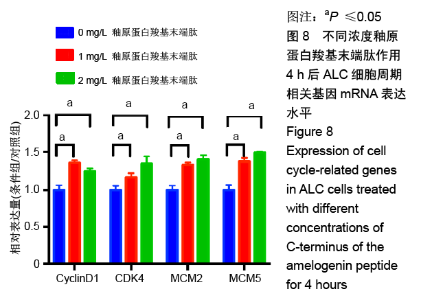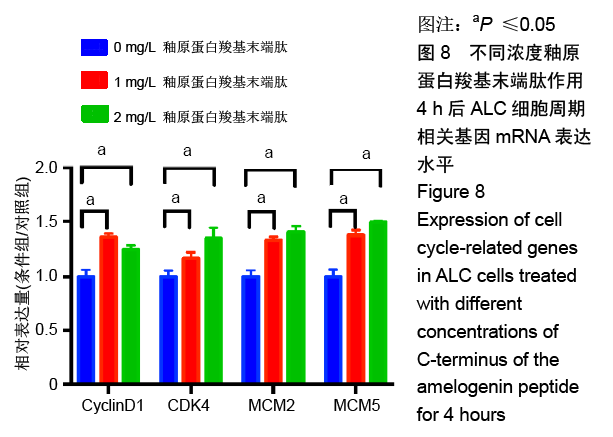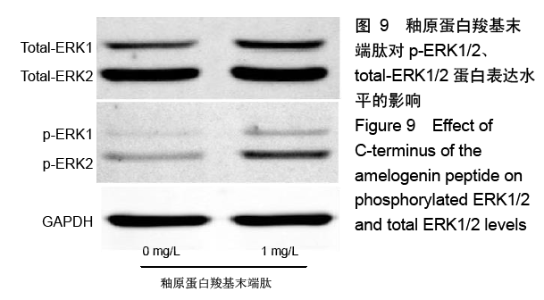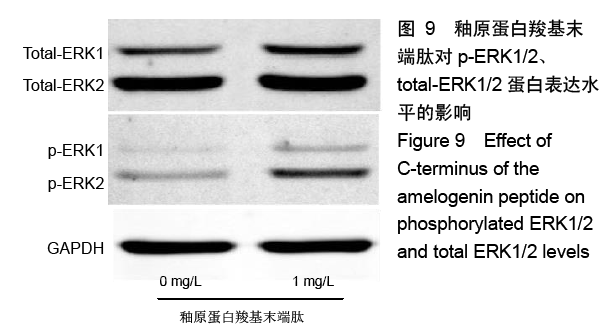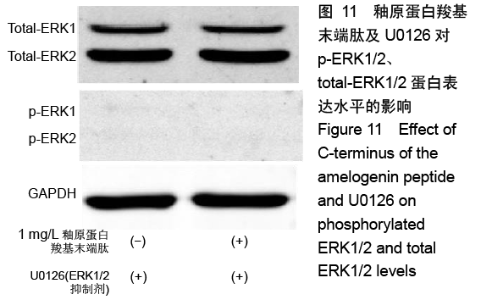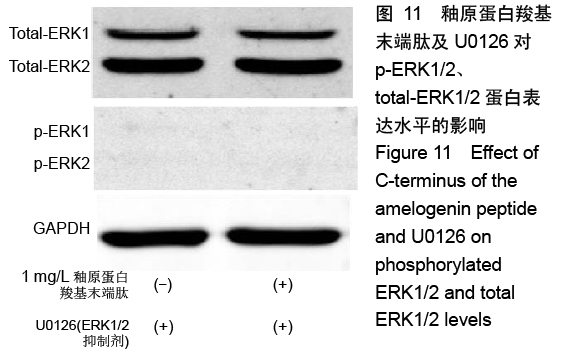Chinese Journal of Tissue Engineering Research ›› 2020, Vol. 24 ›› Issue (1): 99-105.doi: 10.3969/j.issn.2095-4344.1858
Previous Articles Next Articles
The C-terminus of the amelogenin peptide promotes the proliferation of ALC ameloblasts through accelerating cell cycle
Liu Min1, Wang Ruijie1, Song Danyang1, Yang Sui1, Tan Tao2, Wang Lei1, Wang Yixiang3
- 1Department of Prosthodontics, 3Clinical Laboratory, Peking University Hospital of Stomatology, Beijing 100081, China; 2Department of Stomatology, Peking University Shougang Hospital, Beijing 100144, China
-
Received:2019-03-04Revised:2019-03-06Accepted:2019-05-23Online:2020-01-08Published:2019-12-12 -
Contact:Wang Lei, MD, Associate chief physician, Associate professor, Department of Prosthodontics, Peking University Hospital of Stomatology, Beijing 100081, China Wang Yixiang, MD, Researcher, Associate professor, Clinical Laboratory, Peking University Hospital of Stomatology, Beijing 100081, China -
About author:Liu Min, Master candidate, Department of Prosthodontics, Peking University Hospital of Stomatology, Beijing 100081, China -
Supported by:the National Natural Science Foundation of China, No. 81470770; the Beijing Natural Science Foundation, No. 7172240 and No. 7182181
CLC Number:
Cite this article
Liu Min, Wang Ruijie, Song Danyang, Yang Sui, Tan Tao, Wang Lei, Wang Yixiang. The C-terminus of the amelogenin peptide promotes the proliferation of ALC ameloblasts through accelerating cell cycle[J]. Chinese Journal of Tissue Engineering Research, 2020, 24(1): 99-105.
share this article
Add to citation manager EndNote|Reference Manager|ProCite|BibTeX|RefWorks

2.5 AMG-CP对ALC细胞中p-ERK1/2表达作用被阻断剂U0126阻断 2.5.1 U0126阻断细胞MAPK-ERK1/2信号通路后,AMG-CP对ALC细胞增殖的实时动态检测结果 MAPK抑制剂U0126处理后细胞增殖受抑制,作用20 h后生长曲线出现转折点,细胞数量下降。当50 μmol/L U0126抑制剂与1 mg/L AMG-CP同时作用时,细胞增殖的总体趋势是抑制的,在细胞数量增加阶段,50 μmol/L U0126抑制剂+1 mg/L AMG-CP组与50 μmol/L U0126抑制剂组比较差异无显著性意义,在细胞数量下降阶段,50 μmol/L U0126抑制剂+ 1 mg/L AMG-CP组与50 μmol/L U0126抑制剂组比较差异有显著性意义(P ≤ 0.05),见图10。"

| [1] MORADIAN-OLDAK J. Amelogenins: assembly, processing and control of crystal morphology. Matrix Biol. 2001;20(5-6): 293-305. [2] BARTLETT JD, SIMMER JP. Proteinases in developing dental enamel. Crit Rev Oral Biol Med. 1999;10(4):425-441. [3] ZHU L, TANIMOTO K, ROBINSIN S, et al. Comparative properties of recombinant human and bovine matrix metalloproteinase-20. Arch Oral Biol. 2008;53(8):785-790. [4] VEIS A. Amelogenin gene splice products: potential signaling molecules. Cell Mol Life Sci. 2003;60(1):38-55. [5] HAMMARSTRÖM L, HEIJL L, GESTRELIUS S. Periodontal regeneration in a buccal dehiscence model in monkeys after application of enamel matrix proteins. J Clin Periodontol. 1997;24(9 Pt 2):669-677. [6] YOSHIMI Y, KUNIMATSU R, HIROSE N, et al. Effects of C-Terminal Amelogenin Peptide on Proliferation of Human Cementoblast Lineage Cells. J Periodontol. 2016;87(7):820-827. [7] KUNIMATSU R, AWADA T, YOSHIMI Y, et al. The C-terminus of the amelogenin peptide influences the proliferation of human bone marrow mesenchymal stem cells. J Periodontol. 2018;89(4):496-505. [8] ESPOSITO M, COULTHARD P, THOMSEN P, et al. Enamel matrix derivative for periodontal tissue regeneration in treatment of intrabony defects: a Cochrane systematic review. J Dent Educ. 2004;68(8): 834-844. [9] BRETT PM, PARKAR M, OLSEN I, et al. Expression profiling of periodontal ligament cells stimulated with enamel matrix proteins in vitro: a model for tissue regeneration. J Dent Res. 2002;81(11): 776-783. [10] GRAZIANI F, GENNAI S, PETRINI M, et al. Enamel matrix derivative stabilizes blood clot and improves clinical healing in deep pockets after flapless periodontal therapy: A Randomized Clinical Trial. J Clin Periodontol. 2019;46(2):231-240. [11] HAMAMOTO Y, KAWASAKI N, JARNBRING F, et al. Effects and distribution of the enamel matrix derivative Emdogain in the periodontal tissues of rat molars transplanted to the abdominal wall. Dent Traumatol. 2002;18(1):12-23. [12] KUNIMATSU R, TANIMOTO K, TANNE Y, et al. Amelogenin enhances the proliferation of cementoblast lineage cells. J Periodontol. 2011;82(11): 1632-1638. [13] HUANG YC, TANIMOTO K, TANNE Y, et al. Effects of human full-length amelogenin on the proliferation of human mesenchymal stem cells derived from bone marrow. Cell Tissue Res. 2010;342(2): 205-212. [14] TANIMOTO K, KUNIMATSU R, TANNE Y, et al. Differential effects of amelogenin on mineralization of cementoblasts and periodontal ligament cells. J Periodontol. 2012;83(5):672-679. [15] ZOU Y, WANG H, SHAPIRO JL, et al. Determination of protein regions responsible for interactions of amelogenin with CD63 and LAMP1. Biochem J. 2007;408(3):347-354. [16] YAN G, DU Q, WEI X, et al. Application of Real-Time Cell Electronic Analysis System in Modern Pharmaceutical Evaluation and Analysis. Molecules. 2018;23(12): E3280. [17] ZHU C, YU J, PAN Q, et al. Hypoxia-inducible factor-2 alpha promotes the proliferation of human placenta-derived mesenchymal stem cells through the MAPK/ERK signaling pathway. Sci Rep. 2016;6:35489. [18] RYU OH, FINCHAM AG, HU CC, et al. Characterization of recombinant pig enamelysin activity and cleavage of recombinant pig and mouse amelogenins. J Dent Res. 1999;78(3):743-750. [19] BOABAID F, GIBSON CW, KUEHL MA, et al. Leucine-rich amelogenin peptide: a candidate signaling molecule during cementogenesis. J Periodontol. 2004;75(8):1126-1136. [20] HATAKEYAMA J, PHILP D, HATAKEYAMA Y, et al. Amelogenin- mediated regulation of osteoclastogenesis, and periodontal cell proliferation and migration. J Dent Res. 2006;85(2):144-149. [21] LI X, SHU R, LIU D, et al. Different effects of 25-kDa amelogenin on the proliferation, attachment and migration of various periodontal cells. Biochem Biophys Res Commun. 2010;394(3):581-586. [22] AMIN HD, OLSEN I, KNOWLES JC, et al. Differential effect of amelogenin peptides on osteogenic differentiation in vitro: identification of possible new drugs for bone repair and regeneration. Tissue Eng Part A. 2012;18(11-12):1193-1202. |
| [1] | Li Cai, Zhao Ting, Tan Ge, Zheng Yulin, Zhang Ruonan, Wu Yan, Tang Junming. Platelet-derived growth factor-BB promotes proliferation, differentiation and migration of skeletal muscle myoblast [J]. Chinese Journal of Tissue Engineering Research, 2021, 25(7): 1050-1055. |
| [2] | Liu Cong, Liu Su. Molecular mechanism of miR-17-5p regulation of hypoxia inducible factor-1α mediated adipocyte differentiation and angiogenesis [J]. Chinese Journal of Tissue Engineering Research, 2021, 25(7): 1069-1074. |
| [3] | Ma Zetao, Zeng Hui, Wang Deli, Weng Jian, Feng Song. MicroRNA-138-5p regulates chondrocyte proliferation and autophagy [J]. Chinese Journal of Tissue Engineering Research, 2021, 25(5): 674-678. |
| [4] | Jiang Xin, Qiao Liangwei, Sun Dong, Li Ming, Fang Jun, Qu Qingshan. Expression of long chain non-coding RNA PGM5-AS1 in serum of renal transplant patients and its regulation of human glomerular endothelial cells [J]. Chinese Journal of Tissue Engineering Research, 2021, 25(5): 741-745. |
| [5] | Wang Yujiao, Liu Dan, Sun Song, Sun Yong. Biphasic calcium phosphate loaded with advanced platelet rich fibrin can promote the activity of rabbit bone marrow mesenchymal stem cells [J]. Chinese Journal of Tissue Engineering Research, 2021, 25(4): 504-509. |
| [6] | Zhou Jihui, Yao Meng, Wang Yansong, Li Xinzhi, Zhou You, Huang Wei, Chen Wenyao. Influence of novel nanoscaffolds on biological behaviors of neural stem cells and the related gene expression [J]. Chinese Journal of Tissue Engineering Research, 2021, 25(4): 532-536. |
| [7] | Chen Yang, Huang Denggao, Gao Yuanhui, Wang Shunlan, Cao Hui, Zheng Linlin, He Haowei, Luo Siqin, Xiao Jingchuan, Zhang Yingai, Zhang Shufang. Low-intensity pulsed ultrasound promotes the proliferation and adhesion of human adipose-derived mesenchymal stem cells [J]. Chinese Journal of Tissue Engineering Research, 2021, 25(25): 3949-3955. |
| [8] | Zhou Wu, Wang Binping, Wang Yawen, Cheng Yanan, Huang Xieshan. Transforming growth factor beta combined with bone morphogenetic protein-2 induces the proliferation and differentiation of mouse MC3T3-E1 cells [J]. Chinese Journal of Tissue Engineering Research, 2021, 25(23): 3630-3635. |
| [9] | Yu Chengshuai, Du Gang, Pang Shenning, Lao Shan. Chemerin, a pro-inflammatory adipokine, regulates chondrocyte proliferation and metabolism by increasing production of nitric oxide [J]. Chinese Journal of Tissue Engineering Research, 2021, 25(2): 258-263. |
| [10] | Dai Yaling, Chen Lewen, He Xiaojun, Lin Huawei, Jia Weiwei, Chen Lidian, Tao Jing, Liu Weilin. Construction of miR-146b overexpression lentiviral vector and the effect on the proliferation of hippocampal neural stem cells [J]. Chinese Journal of Tissue Engineering Research, 2021, 25(19): 3024-3030. |
| [11] | Ailimaierdan·Ainiwaer, Wang Ling, Gu Li, Dilidaer•Taxifulati, Wang Shan, Yin Hongbin. Effect of transforming growth factor-beta3 on the proliferation and osteogenic capability of osteoblasts [J]. Chinese Journal of Tissue Engineering Research, 2021, 25(17): 2664-2669. |
| [12] | Wang Renxian, Cao Jingjing, Wang Honggang, Wan Ben, Liu Weifeng. Effects of dispersants on aggregation, intracellular distribution and cell proliferation of nano-hydroxyapatite [J]. Chinese Journal of Tissue Engineering Research, 2021, 25(16): 2500-2505. |
| [13] | Jiang Tao, Wu Shuo, Li Zhiqiang, Shou Xi, Mayire·Nuermaimaiti, Ma Chuang, Wei Qin. Platelet-derived growth factor BB promotes the proliferation of bone marrow mesenchymal stem cells of Sprague-Dawley rats [J]. Chinese Journal of Tissue Engineering Research, 2021, 25(13): 1976-1981. |
| [14] | Yan Nan, Si Xiaofeng, Zeng Liang, Tian Wei, Shan Guangdong, Xiong Lishuo, Yang Weijie, Wang Zhengdong. Nerve growth factor interferes with proliferation and alpha-actin expression of skeletal muscle satellite cells in rats [J]. Chinese Journal of Tissue Engineering Research, 2021, 25(13): 2030-2035. |
| [15] | Wang Huili, Chen Zhijiang, Wu Bingyi. Glia maturation factor-gamma inhibits the proliferation of human colorectal cancer LoVo cells and affects the cytoskeletal motion of human umbilical vein endothelial cells [J]. Chinese Journal of Tissue Engineering Research, 2021, 25(13): 2055-2059. |
| Viewed | ||||||
|
Full text |
|
|||||
|
Abstract |
|
|||||
